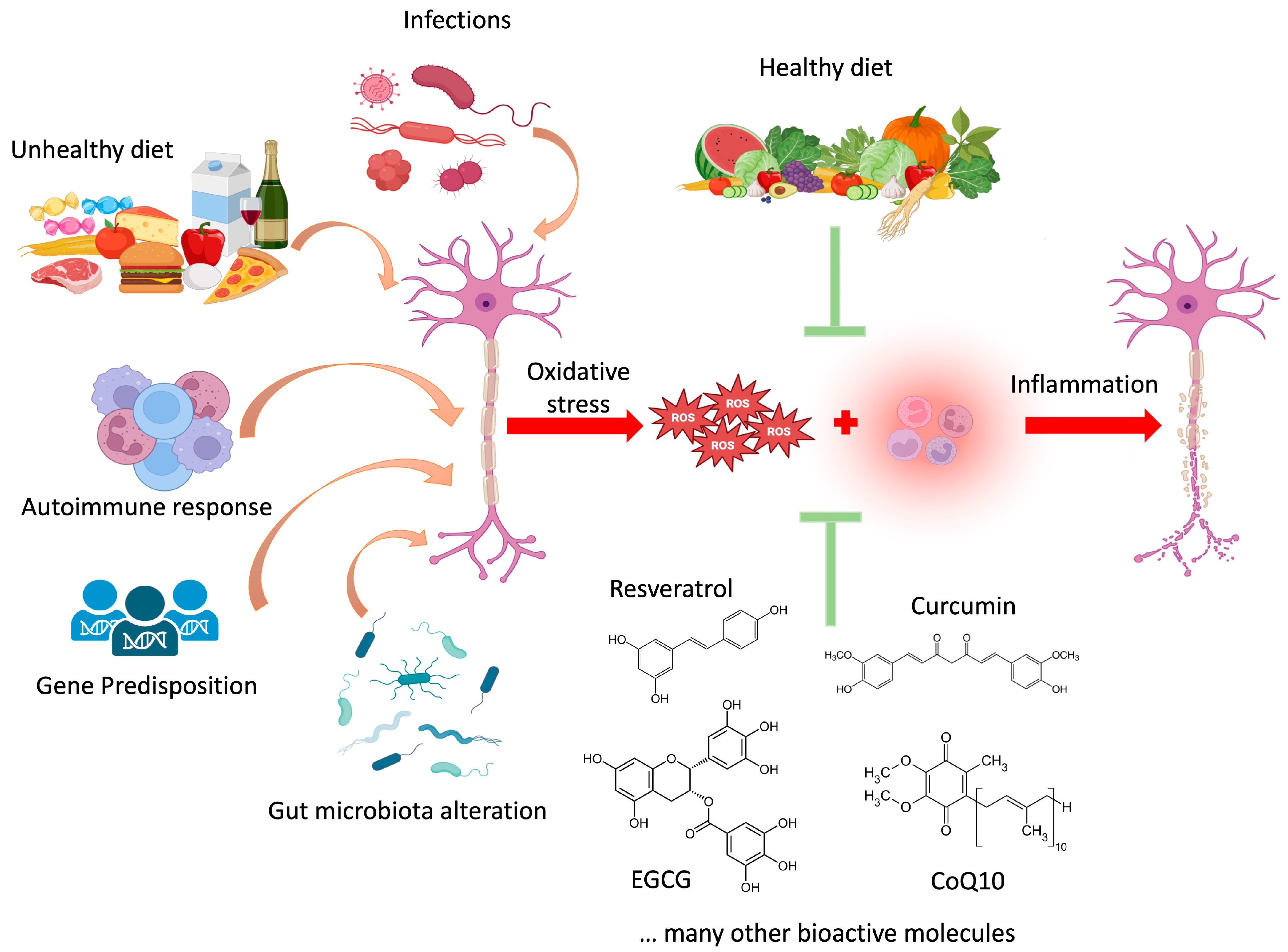Nutrition and Bioactive Molecules in Multiple Sclerosis Management
Multiple sclerosis (MS) is a complex immune-mediated neurodegenerative disease characterized by the immune system attacking the central nervous system, leading to demyelination. With significant social costs and a high prevalence in industrialized countries, MS has been linked to environmental factors like diet, vitamin D levels, and smoking, alongside genetic susceptibilities. This review by Gabriele Tancreda, Silvia Ravera, and Isabella Panfoli, published in "Current Issues in Molecular Biology," explores the influence of diet and bioactive molecules on MS progression and management.
Factors such as low vitamin D, poor diet, and exposure to toxins are pivotal in MS etiology. It predominantly affects individuals in industrialized nations, with the highest prevalence in North America. Genome-wide association studies have linked MS susceptibility to the HLA-DRB1 gene. The disease impacts physical and cognitive functions, with symptoms ranging from depression to cognitive impairments. Early MS stages are dominated by inflammation, progressing to degenerative processes in later stages. Disease-modifying therapies (DMTs) aim to prevent relapses and disability progression, though no DMT can suppress all relapses.

Schematic representation of factors contributing (orange arrows) to oxidative stress and inflammation, causes (red arrows) of axonal demyelination in MS, and corrective factors (bioactive substances and a healthy diet) that could reduce (green arrows) the impact of triggering factors. ROS: Reactive Oxygen Species; EGCG: Epigallocatechin gallate; CoQ10: Coenzyme Q10. (Tancreda, G. et. al. (2024))
Natural Compounds of Interest in MS
Ubiquinone (CoQ10)
Coenzyme Q10 (CoQ10) is essential for mitochondrial function, aiding in electron transport and acting as an antioxidant. Studies have shown that CoQ10 supplementation can reduce inflammatory markers like TNF-α and IL-6 in MS patients. It also helps lower oxidative stress and improve antioxidant enzyme activity, suggesting potential as an adjunct therapy for MS.
Resveratrol
Resveratrol, a polyphenol found in various plants, exhibits neuroprotective and anti-inflammatory properties. It reduces oxidative stress, enhances antioxidant enzyme activity, and modulates inflammatory pathways. Preclinical studies indicate that resveratrol can alleviate MS symptoms by reducing neuroinflammation and promoting remyelination.
Curcumin
Curcumin, derived from turmeric, possesses immunomodulatory, antioxidant, and neuroprotective properties. It inhibits pro-inflammatory cytokines and modulates T-cell responses, promoting immune tolerance. Curcumin enhances antioxidant defense and supports remyelination, making it a promising adjuvant in MS treatment.
Epigallocatechin Gallate (EGCG)
EGCG, a flavonoid in green tea, has significant anti-inflammatory and antioxidant properties. It reduces pro-inflammatory cytokine production and enhances regulatory T-cell populations. Clinical trials show that EGCG supplementation, alongside a Mediterranean diet, can decrease IL-6 levels and improve anxiety and functional capabilities in MS patients.
Diet and MS
Ketogenic or Mediterranean Diet
The ketogenic diet (KD), rich in lipids and low in carbohydrates, induces ketosis, reducing oxidative stress and inflammation. Clinical trials indicate that KD can improve clinical outcomes and quality of life in MS patients. The Mediterranean diet (MD), characterized by high intake of fruits, vegetables, and healthy fats, also shows potential in managing MS. It reduces IL-6 levels and improves psychological and functional parameters.
β-Hydroxybutyrate
Ketone bodies like β-hydroxybutyrate, derived from coconut oil, reduce neuroinflammation and provide neuroprotective effects. They activate receptors on neuroinflammatory cells, mitigating inflammation in MS.
Other Dietary Supplements
Omega-3 Fatty Acids: These exert anti-inflammatory and neuroprotective effects, reducing relapse rates and improving cognitive function in MS patients.
Vitamins A, C, and E: These antioxidants reduce oxidative stress and inflammation, preserving neuronal integrity.
Vitamin D: Deficiency is linked to MS progression. Supplementation can reduce disease activity and progression.
Probiotics: Emerging evidence links gut microbiota dysbiosis to MS, suggesting probiotics could modulate immune responses.
Conclusion
Despite advances in pharmacological therapies, many MS patients seek complementary treatments to alleviate symptoms and improve quality of life. Natural bioactive compounds, through dietary supplementation or changes, show potential in modulating inflammation and oxidative stress in MS. While preclinical studies are promising, further human clinical trials are needed to verify the therapeutic efficacy and safety of these interventions. A holistic approach combining pharmacological treatment with a healthy lifestyle and nutrient supplementation could offer a customizable path for MS management.
References:
Tancreda, G.; Ravera, S.; Panfoli, I. Exploring the Therapeutic Potential: Bioactive Molecules and Dietary Interventions in Multiple Sclerosis Management. Curr. Issues Mol. Biol. 2024, 46, 5595–5613.

